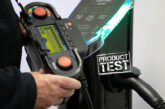
Reece Fitzhardy gets to grips with Tysoft’s EasyCert Electrical Software.
It’s often said that three things in life are certain: death, taxes and the need to produce electrical certificates! OK, well the final point may be open to debate, but if you work as a professional electrician/engineer it’s almost a certainty that you’d have encountered some form of electrical certification along the way. And if you’ve filled these out by hand, you’ll know just how time-consuming they can be.
In recent times, solutions have arrived that have made life much easier for us sparkies, and the EasyCert Electrical Software from Tysoft is a great example of this.
The product does have the option for mobile use, but the version I’ve used for this review is purely the desktop package, which is run on Windows. The software is very easy to use and I had no problems with getting started with it almost immediately.
A whole plethora of pro-forma certificates to cover every eventuality are available to users, with each contained within their own relevant categories to help you find what you need quickly. Options include: Domestic (installation certificate, installation condition report, minor installation works, minor installation multiple works and visual condition report); Industrial & Commercial (installation certificate, minor installation certificate, minor installation works/multiple works and electrical danger notification); Emergency Lighting (installation certificate, periodic inspection, commissioning modification and verification, and fire extinguisher report); and Solar PV (checklist, client handover, inspection report, verification certificate and small electrical generation commission report).
The main screen is simple to navigate and gives you options to create a new certificate, open an existing one, save one you’re working on, or print our directly. The website also gives some useful screenshots to help explain this process and what you need to do.
Also included within the programme are sheets of standard devices’ BS/EN numbers, along with capacity ratings/timings, which is particularly handy and makes the need to refer to BS7176 less urgent.
The software is suitable for both sole traders and larger firms, offering options for different named test engineers who may be using contrasting sets of kit. This can then be self-authorised, or deferred for signing.
Overall, the real beauty of this system comes in its simplicity. We all understand and recognise the value of having accurate, professional looking electrical certification, and the EasyCert software allows all sizes of business to achieve this. Company logos can also be copied to the form, colours set and headers/footers inserted to personalise the certificates even further. There’s even the option to add an electronic signature, if desired. The process is very easy to follow and, once you’ve entered the required information, you move on to the next page before printing your completed certificate.
I’ve been really impressed by the EasyCert software and the high quality of the certificates available to the end user. I shudder to think about the time I’ve spent manually hand-writing certificates over the years but, thanks to this software, that process is pretty-much taken care of in half the time. A simple but excellent solution to a task that can be a real headache for electricians, I’d recommend that you give EasyCert a go.
For more details about the EasyCert electrical software from Tysoft, go to: http://www.tysoft.co.uk/easycert.htm









